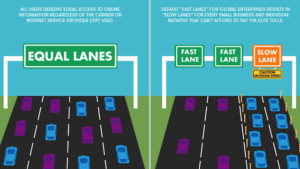
Sarah Berg
Staff Writer
Net neutrality is the idea that Internet Service Providers (ISPs) should provide access to all content and not favor or block any websites. Regulations put forth by the Federal Communications Commission (FCC) allow for net neutrality to exist. Basic internet regulations have been in place since 2005, but in 2015, under the Obama administration, they were strengthened, when the internet was put under Title II regulations. These regulations prevent (ISPs) from tampering with speeds and charging for better speeds and access to different sites. As savetheinternet.com put it, net neutrality “preserves our right to communicate freely online.”
Pai’s Plan
In April of this year, FCC Chairman and Republican Ajit Pai announced his plan to reverse the classification of internet providers under Title II of the Communications Act of 1934. This act classifies common carriers under its Title II. Internet service was put under Title II in 2015, and this classification allowed the FCC the legal right to enforce net neutrality rules.
Pai is a former lawyer for Verizon who was appointed the position of chairman by President Trump in January. He argues that ISPs need better profits because investments in the industry have gone down since 2015. He has been vocal since the new rules were voted on then, saying that the government was meddling with the internet although he believed “the internet is not broken. There is no problem to solve”.
Despite many calls for them to push the vote back, and a majority of comments on the FCC’s website supporting net neutrality, on December 14th, the FCC voted 3-2 in favor of Pai’s proposal. The vote was predictably along party lines, with Pai and other Republicans voting it in.
What is at risk?
Without net neutrality, ISPs will be able to slow down and speed up connections to different websites and services, playing a large role in determining which ones succeed. They will be able to block access to content they do not agree with, whether it be political or competitive products or services.
Groups who depend on the internet to organize and communicate will be in jeopardy without net neutrality, along with small businesses. Companies will have to pay for a place in the “fast lane”. This will give large, successful businesses an advantage over smaller ones, who may struggle to pay the fee. These businesses will then have a much harder time advertising and hosting their markets.
Companies that are against the FCC’s new proposal are either small businesses who rely on the internet, or social medias and online services. Some companies who have spoken out against Pai’s plan include Discord, Reddit, Tumblr, Twitter, Etsy, AirBnb, Netflix, Google, and Amazon — basically every big commerce or social media site.
What now?
All over social medias and in real life, I have seen people freaking out about the vote. Misinformation is spreading, with people saying that you will now have to pay $2 for every Google search, or $10 for monthly access to Instagram. This is not the case. What we are more likely to see are increased prices for fast lines, if anything.
Congress still has the ability to overrule the FCC’s vote, by passing a resolution of disapproval. As well as this, many democrats are calling for a bill to counter the FCC’s decision, and some attorney generals are planning to take legal action to prevent the changes from occuring.
Even if the FCC’s decision passes, you may not actually see major changes to the internet. Some companies, including AT&T and Comcast, have said that the online experience will not change.
In short, we will have to wait to see what is going to happen to net neutrality. You can visit https://www.battleforthenet.com/ to send a message to Congress telling them to overturn the FCC’s vote. You can also text RESIST to 50409, and the Resistbot will help you contact your representatives.
Leave a Reply